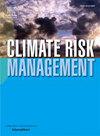The impact of climate change on household dietary diversity in Afghanistan
IF 5
2区 环境科学与生态学
Q1 ENVIRONMENTAL SCIENCES
引用次数: 0
Abstract
Climate change adaptation policies and research have traditionally focused on dietary quantity, neglecting dietary quality, particularly in developing countries like Afghanistan. This study aims to identify how climate change affects household dietary diversity and whether the impacts are consistent across different food groups. To examine the impact of climate change on dietary diversity in Afghanistan, a climate change proxy variable (temperature) was created at the district level by calculating the difference from its long-term mean. Meanwhile, the Household Dietary Diversity Score (HDDS) was obtained from three rounds of household survey data conducted between 2011 and 2017, which included information from 60,099 households. Negative binomial regression analysis reveals a positive association between climate change and HDDS. That is, higher temperatures would lead to the higher availability of diverse diets in Afghanistan. Interestingly, climate change appears to affect food groups heterogeneously. While staple food consumption frequency remains unaffected, non-staple food consumption increases with higher temperatures. The results remain consistent after incorporating precipitation and two lagged versions of temperature and precipitation into the model. Therefore, the climate adaptation policies of the government of Afghanistan should consider different policy implications for staple and non-staple foods. These findings have policy implications for achieving food security and climate change-related Sustainable Development Goals (SDGs) such as SDG 2 (zero hunger) and SDG 13 (climate action).
气候变化对阿富汗家庭饮食多样性的影响
气候变化适应政策和研究传统上侧重于饮食数量,而忽视了饮食质量,特别是在阿富汗等发展中国家。本研究旨在确定气候变化如何影响家庭饮食多样性,以及这种影响在不同的食物群体中是否一致。为了研究气候变化对阿富汗饮食多样性的影响,通过计算其长期平均值的差异,在地区一级创建了一个气候变化代理变量(温度)。同时,从2011年至2017年进行的三轮家庭调查数据中获得了家庭饮食多样性评分(HDDS),其中包括来自60,099个家庭的信息。负二项回归分析显示气候变化与hds呈正相关。也就是说,更高的温度将导致阿富汗更容易获得多样化的饮食。有趣的是,气候变化对食物群体的影响似乎各不相同。虽然主食的消费频率不受影响,但副食品的消费随着温度的升高而增加。将降水和两个滞后版本的温度和降水纳入模型后,结果保持一致。因此,阿富汗政府的气候适应政策应考虑对主粮和副粮的不同政策影响。这些发现对实现可持续发展目标2(零饥饿)和可持续发展目标13(气候行动)等与粮食安全和气候变化相关的可持续发展目标具有政策意义。
本文章由计算机程序翻译,如有差异,请以英文原文为准。
求助全文
约1分钟内获得全文
求助全文
来源期刊

Climate Risk Management
Earth and Planetary Sciences-Atmospheric Science
CiteScore
8.20
自引率
4.50%
发文量
76
审稿时长
30 weeks
期刊介绍:
Climate Risk Management publishes original scientific contributions, state-of-the-art reviews and reports of practical experience on the use of knowledge and information regarding the consequences of climate variability and climate change in decision and policy making on climate change responses from the near- to long-term.
The concept of climate risk management refers to activities and methods that are used by individuals, organizations, and institutions to facilitate climate-resilient decision-making. Its objective is to promote sustainable development by maximizing the beneficial impacts of climate change responses and minimizing negative impacts across the full spectrum of geographies and sectors that are potentially affected by the changing climate.
 求助内容:
求助内容: 应助结果提醒方式:
应助结果提醒方式:


